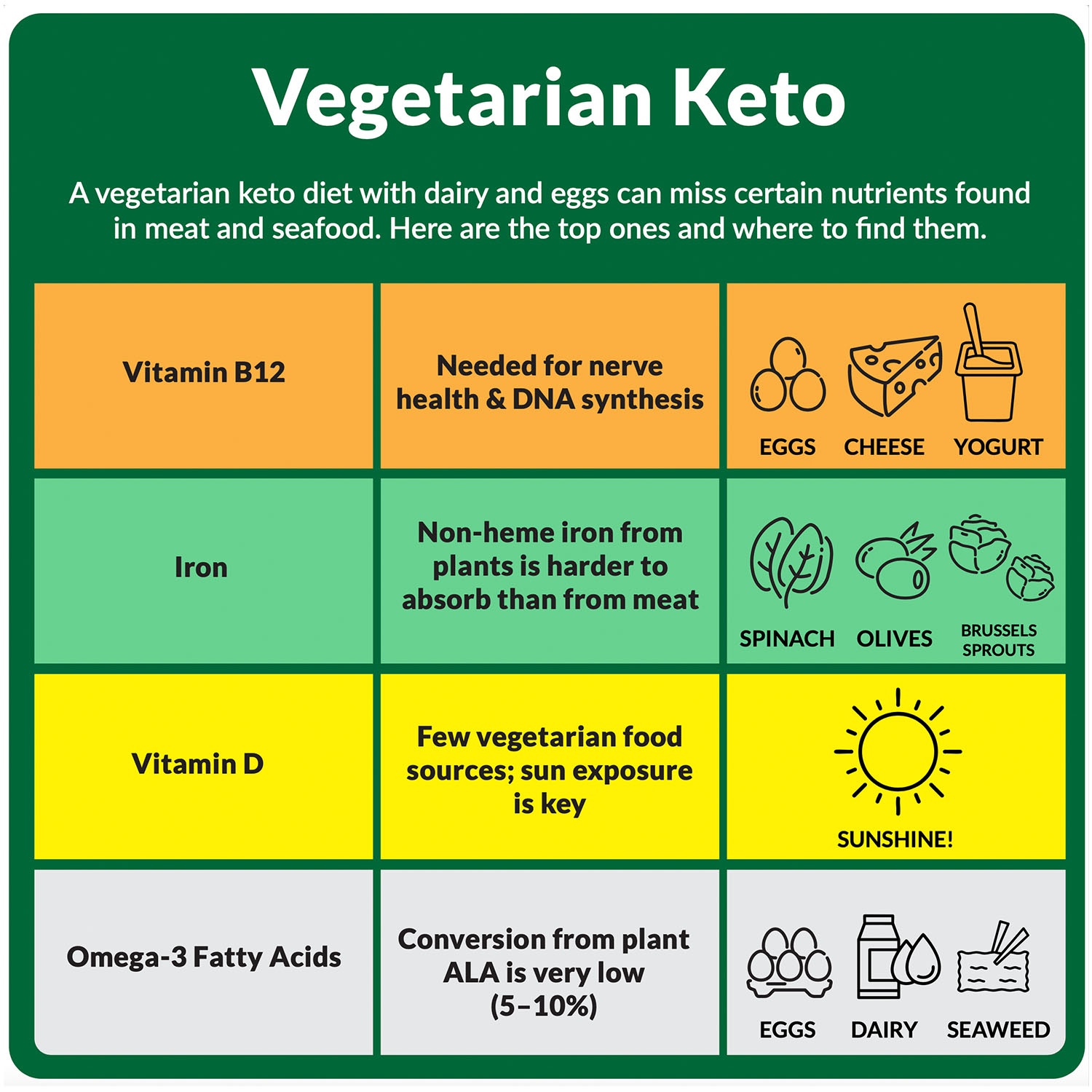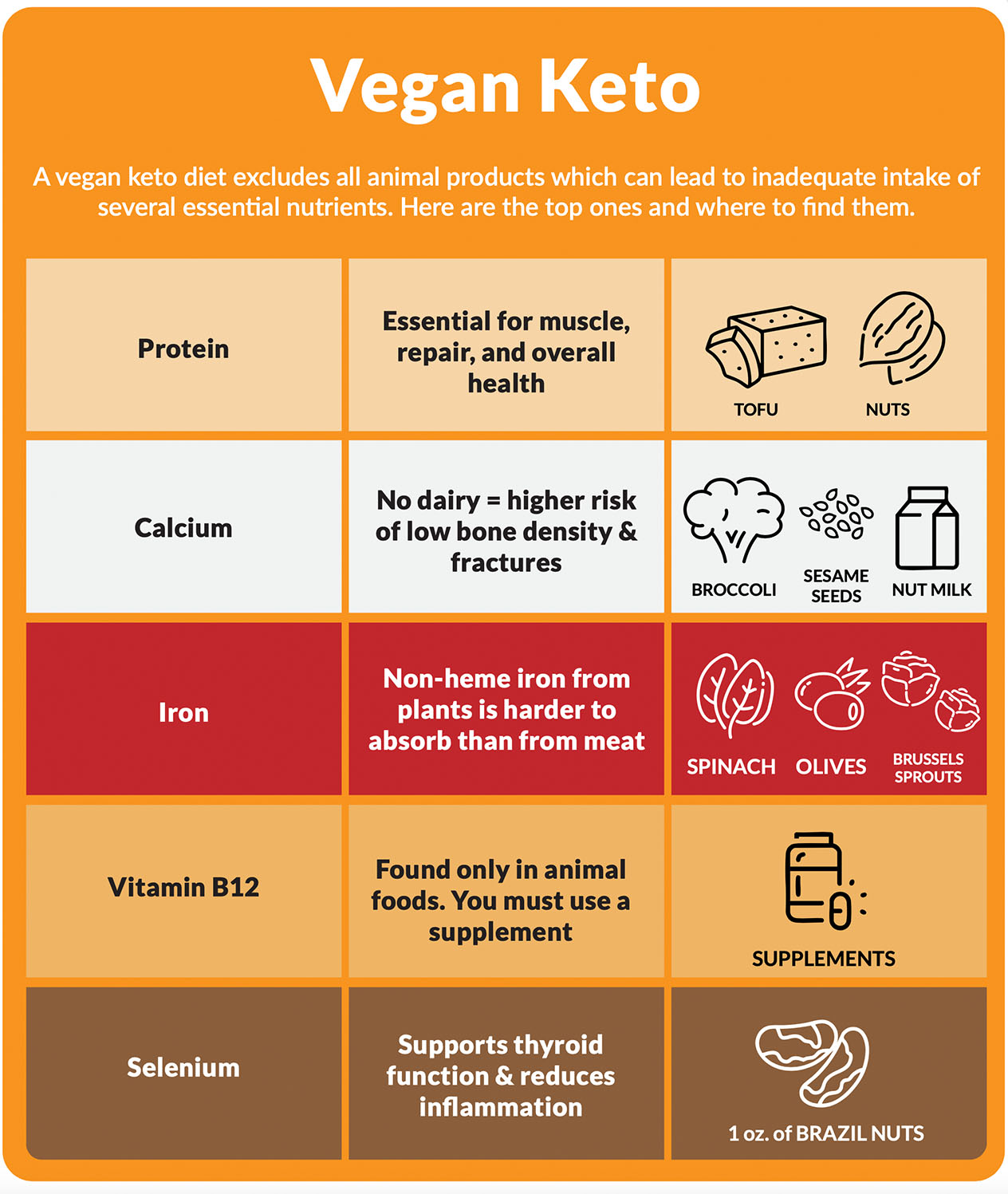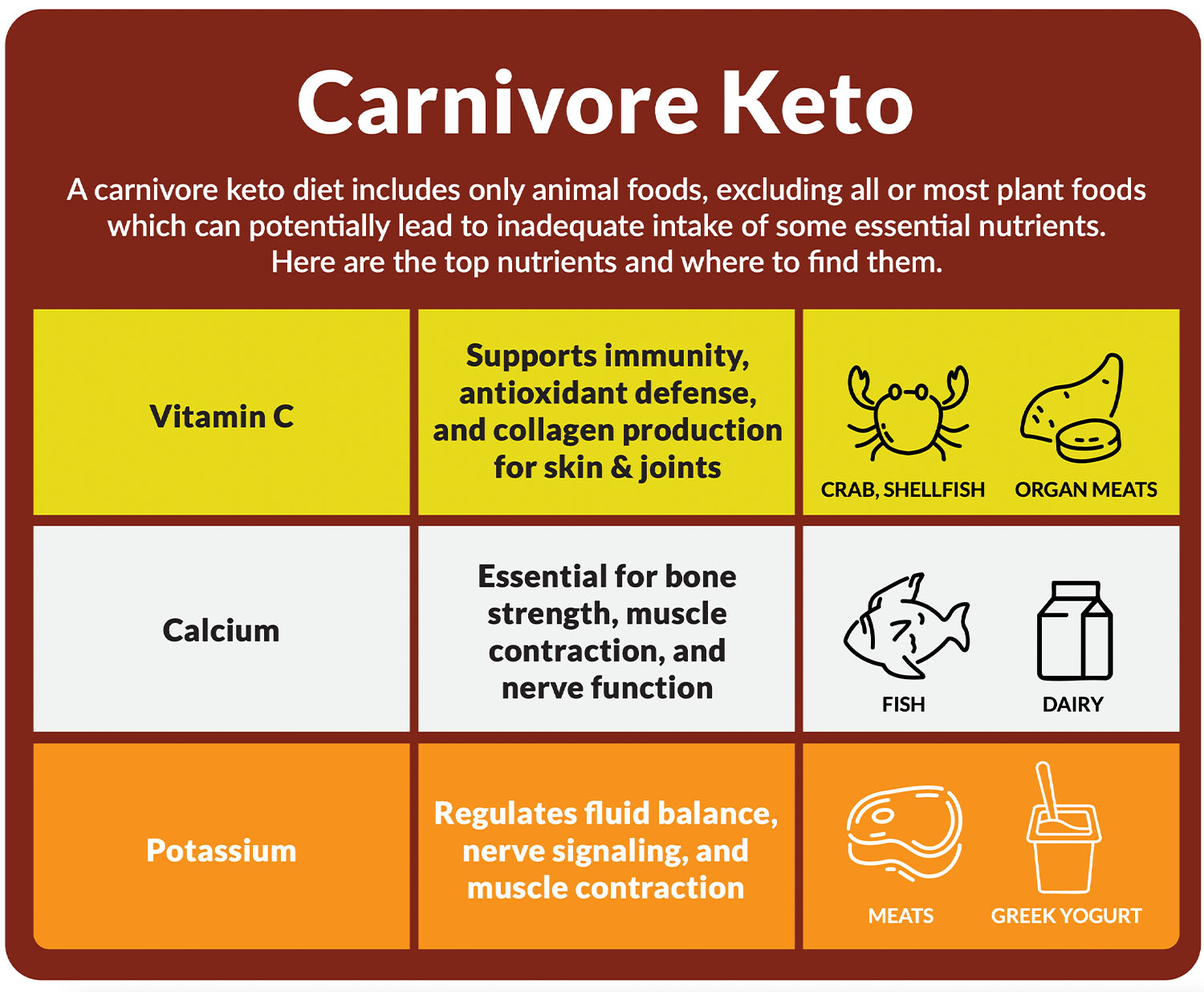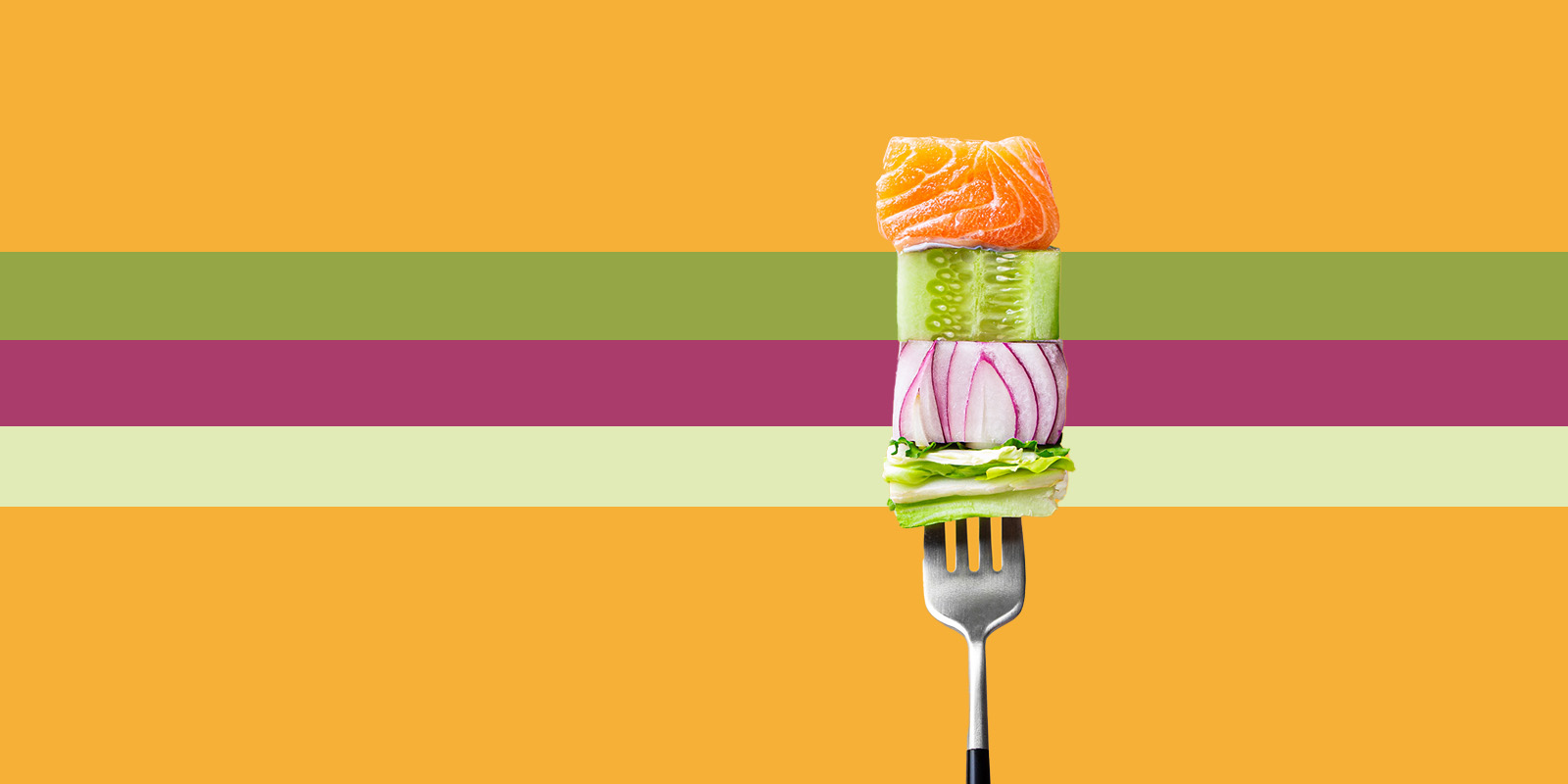Ketogenic diets are supported by strong evidence for benefits in metabolic health, weight loss, glycemic control, and managing epilepsy. In addition, growing research supports this approach for treating serious mental health disorders and neurological conditions. Eating a well-formulated ketogenic diet that includes a diverse range of animal and plant foods can usually meet all your nutrition needs. However, different types of ketogenic lifestyles come with unique nutritional challenges. This article covers the key nutrients to watch for in three ketogenic approaches and offers practical tips for meeting essential nutrient needs over the long term.
Note: Nutrient recommendations are based on the U.S. Recommended Daily Allowance (RDA) and Adequate Intake (AI), which are generally similar to guidelines in other countries, although specific nutrients may vary.
Vegetarian Ketogenic Lifestyle

The most common type of vegetarian diet, lacto-ovo, includes dairy and eggs but excludes meat and seafood. This can limit access to some nutrients that are abundant in red meat, poultry, fish, and shellfish.
Nutrients of Concern for Lacto-Ovo Vegetarians:
- Vitamin B12: Primarily found in animal products, vitamin B12 (cobalamin) is needed for nerve health and DNA synthesis. It’s often assumed that a lacto-ovo vegetarian diet provides enough vitamin B12 through dairy and eggs. However, without meat and seafood, these sources alone may not supply the recommended daily intake of 2.4 micrograms for adults.
- Iron: Plant-based non-heme iron is less easily absorbed than the heme iron found in meat and fish, which increases the risk of deficiency for vegetarians. In some studies, people following vegetarian diets were found to have lower iron stores and higher rates of iron-deficiency anemia than non-vegetarians. The recommended intake for iron is 18 milligrams for premenopausal women and 8 milligrams for men and postmenopausal women.
- Vitamin D: Vitamin D is crucial for bone health and maintaining a strong immune system. Your body produces vitamin D when your skin is exposed to sunlight. However, without regular sun exposure, vegetarians may struggle to meet their vitamin D needs, as the only naturally vitamin-D-rich food is fatty fish, with smaller amounts found in egg yolks and mushrooms. For this reason, vitamin D is considered a nutrient of concern among people who follow vegetarian or vegan diets. The recommended intake for vitamin D is 600 IU for most adults and 800 IU for those over 70 years of age. However, a growing number of experts now recommend higher amounts to maintain optimal vitamin D levels in the blood.
- Omega-3 fatty acids: Because many plants contain the short-chain omega 3 fatty acid alpha-linolenic acid (ALA), vegetarian diets are often assumed to easily meet the recommended intake of 1.6 grams per day for men and 1.1 grams per day for women. Your body can convert a portion of ALA into the long-chain omega-3 fatty acids eicosapentaenoic acid (EPA) and docosahexaenoic acid (DHA), which play important roles in reducing inflammation, improving chronic disease, and protecting brain health. Unfortunately, most people have a very low conversion rate, with only 5-10% of ALA converting to EPA and 2-5% of ALA converting to DHA. High intakes of the omega-6 fatty acid linoleic acid—most concentrated in vegetable and seed oils—contribute to these low conversion rates. Dairy and eggs contain some EPA and DHA, but in much lower amounts than those found in fatty fish and grass-fed meat. Algae is another vegetarian source of long-chain omega-3 fatty acids. There is currently no recommended intake of EPA and DHA.
Practical Advice for Meeting Nutrition Needs:
- Vitamin B12: Including generous portions of animal foods that contain vitamin B12 at meals can help you meet the recommended intake without needing to take supplements.
Example of daily intake to meet the recommended daily intake of 2.4 micrograms*:
-
-
- 3 eggs, 1 to 1.5 ounces (28 to 43 grams) of cheese, and ¾ cup (180 grams) of whole-milk Greek yogurt
-
Note: The vitamin B12 content in cheese varies by type. Below are the amounts of vitamin B12 found in 1 ounce (28 grams) of different cheeses:
-
-
- Swiss cheese: 0.9 micrograms
- Mozarella cheese: 0.6 micrograms
- Feta, brie, cottage cheese, and most other types: 0.5 micrograms
- Cheddar and Parmesan: 0.3 micrograms
-
- Iron: Pair foods that are high in non-heme iron (such as leafy greens, fermented soy, olives, seeds, and 100% dark chocolate) with keto-friendly sources of vitamin C (such as bell peppers, broccoli, and Brussels sprouts) to enhance iron absorption.
Example of daily intake to meet the recommended daily intake of 8 milligrams:*
-
-
- ½ cup (90 grams) of cooked spinach, 1/3 cup of olives, and 1 cup (160 grams) of cooked Brussels sprouts
-
- Vitamin D: If you don’t get much sun, you might need to take a supplement to maintain optimal blood levels of vitamin D levels. However, before supplementing with vitamin D, have your levels checked by your healthcare provider. If you take a supplement, your healthcare provider should recheck labs periodically so they can adjust the dosage of vitamin D as needed.
- Omega-3 fatty acids: Select eggs from hens that are raised on pasture or fed diets supplemented with fish oil and choose dairy from grass-fed cows to increase your intake of DHA and EPA. To improve the conversion of ALA from plants to DHA and EPA, limit or avoid vegetable and seed oils. Consuming seaweed or algae supplements can also boost long-chain omega-3 fatty acid intake (For more information, see the next section on vegan ketogenic diets).
For more information about following a vegetarian ketogenic lifestyle, see Can Vegans and Vegetarians Do Keto?
Vegan Ketogenic Diet

A vegan ketogenic diet excludes all animal products; includes plant-based protein sources like soy, nuts, and seeds; and focuses on plant-based fats such as avocado, coconut, and olive oil. This approach may lead to inadequate intake of several essential nutrients that are usually provided by animal-based foods.
Nutrients of Concern for Vegans:
- Protein: Adequate protein intake is critical for overall health and maintaining muscle mass. Unfortunately, it can be difficult to meet protein requirements on a vegan ketogenic lifestyle. Animal protein is considered “complete” because it provides all nine essential amino acids (the building blocks of protein) in optimal amounts. With the exception of soy, most plant proteins are considered “incomplete” because they are low in one or more of the essential amino acids. In addition, plant proteins aren’t as bioavailable as animal proteins, meaning your body doesn’t digest, absorb, and metabolize them as easily.
- Vitamin B12: Because vitamin B12 is only found in animal foods, individuals who follow a vegan diet will need to supplement with this micronutrient to prevent deficiency.
- Calcium: Meeting calcium needs can be challenging on a dairy-free, plant-based diet, and insufficient intake can affect bone health. Research indicates that vegans tend to have lower bone density and a higher risk of fractures compared to those whose diets include animal products. The recommended daily intake for calcium is 1,000 milligrams for most adults.
- Iron: Non-heme iron from plants is less readily absorbed by the body compared to the heme iron found in meat and fish, increasing the risk of iron deficiency among people who avoid animal foods.
- Selenium: Selenium is a trace mineral involved in thyroid function and reducing inflammation. Although selenium is found in some plants, studies have found that people eating vegan diets are deficient in this essential mineral. The recommended intake for selenium is 55 micrograms per day for adults.
- Iodine: Iodine is another trace mineral that plays an important role in thyroid hormone production. Because iodine is mainly found in seafood and dairy products, vegans may have difficulty meeting the recommended intake of 150 micrograms. Moreover, individuals who regularly consume soy products, as many vegans and vegetarians do, may require higher doses of iodine to prevent goiter and hypothyroidism.
- Vitamin D: Since very few plants provide vitamin D, vegans are at a higher risk of deficiency than omnivores unless they get regular sun exposure.
- Omega-3 fatty acids: As discussed in the section on vegetarian ketogenic diets above, plants provide omega-3 fatty acids in the form of ALA, but only a small percentage is converted to the long-chain omega-3 fatty acids EPA and DHA that the body requires. The poor conversion rate can lead to suboptimal EPA and DHA status in vegans.
- Zinc: Zinc is involved in several important processes in the body, including immune function, wound healing, and metabolism. Although zinc is found in some plants, animal foods provide significantly higher amounts of this mineral. Researchers have identified zinc as a nutrient that may be deficient in vegan diets. The recommended intake for zinc is 8 milligrams per day for women and 11 milligrams per day for men.
Also, although it isn’t yet considered an essential nutrient, there is some evidence that the saturated fatty acid C15:0 may provide health benefits. Since C15:0 is primarily found in animal products and exists only in tiny amounts in plants, vegans are likely to be deficient in this nutrient. Read more in our article on C15:0.
Practical Advice for Meeting Nutrition Needs:
- Protein: Since most plant-based proteins are incomplete and less bioavailable than animal proteins, vegans should aim for higher protein amounts at meals and include a variety of keto-friendly sources—such as soy, nutritional yeast, nuts, seeds, and vegetables—to ensure they get enough of all nine essential amino acids. It’s possible that you may not be able to meet your protein needs without including supplements like plant-based protein powder. Protein needs are based on your size and other factors. To learn more about meeting your protein requirements, see Protein Basics for Thriving on a Ketogenic Diet.
-
Vitamin B12: A B12 supplement is required for people who follow a vegan diet. Look for vitamin B12 designated “methylcobalamin,” which is the most bioavailable form. With adequate supplementation, vegans can achieve adequate vitamin B12 status.
-
Calcium: Leafy greens, broccoli, and minimally processed soy products (edamame, tempeh, and tofu) are good non-dairy sources of calcium.
Examples of daily intake to meet the daily recommended intake of 1,000 milligrams:*
-
-
- 8 ounces (250 grams) of extra-firm tofu, one cup (160 grams) of cooked broccoli, and ¼ cup (28 grams) of sesame seeds
- 1 cup (250 ml) of calcium-fortified nut milk, one cup (190 grams) of cooked collard greens, and 2 Tablespoons (20 grams) of chia seeds
-
-
Iron: As suggested in the section on vegetarian ketogenic diets, consume keto-friendly non-heme plant sources of iron with foods rich in vitamin C to boost absorption.
Example of daily intake to meet the recommended daily intake of 8 milligrams:*
-
-
- 1 cup (165 grams) of tempeh and 1 cup (175 grams) of cooked of cooked chard
-
-
Selenium: Brazil nuts contain more selenium than any other food, with a single nut meeting the daily recommended amount of 55 micrograms. However, because selenium is only needed in tiny quantities, regularly eating too many Brazil nuts can be problematic. Learn more in our blog post about Brazil nuts.
-
Iodine: Algae (seaweed, including kelp), is a good vegan source of iodine. Using iodized salt in cooking or adding it at the table is another way to help meet your iodine needs.
Examples of daily intake to meet the recommended daily intake of 150 micrograms:*
-
-
- ½ to ¾ teaspoon of iodized salt
- Approximately 4 sheets (8 grams) of nori seaweed
-
Remember that if you regularly consume soy foods, you may require more iodine than what is typically recommended. Speak with your healthcare provider or dietitian about the amount you should aim for.
- Vitamin D: Vegans without regular sun exposure may need a vitamin D supplement to maintain optimal levels. Before starting, it’s best to have vitamin D levels checked by a healthcare provider. Levels should be monitored periodically so that the dosage of vitamin D can be adjusted as needed.
-
Omega-3 fatty acids: Flax, chia, and hemp seeds are good vegan sources of ALA. Because the conversion rate of ALA to EPA and DHA is low, it’s recommended that vegans consume a minimum of 2.2 grams of ALA per day and avoid or limit foods very high in linoleic acid, such as seed oils.
Examples of daily intake providing at least 2.2 grams of ALA:
-
-
- 1 tablespoon (12 grams) of chia seeds
- 1 ounce (28 grams) of hemp seeds
- 1 ounce (28 grams) of walnuts
- 2 tablespoons (14 grams) of ground flaxseed
-
In addition to providing iodine, algae is a good vegan source of DHA. In clinical trials, supplementing with algae significantly increased DHA levels in vegans and vegetarians. The amount of DHA in seaweed and other sea vegetables vary widely by type. Algae oil supplements typically contain 100 to 300 mg of DHA per soft gel, and some brands also contain EPA. The U.S. provides intake recommendations only for ALA, but many other countries recommend intakes of 200 to 500 mg of EPA and DHA daily.
- Zinc: Plant-based sources of zinc include fermented soy products like tempeh and miso, seeds, mushrooms, and dark chocolate. However, since very few plants are high in zinc, supplementation may be necessary to consistently meet nutrition needs, especially for men, who have a higher zinc requirement.
Examples of daily intake to meet the recommended daily intake of 8 milligrams:*
-
-
- 1 cup (165 grams) of tempeh and two ounces (56 grams) of pumpkin seeds
- ½ cup (75 grams) of sesame seeds, two cups (300 grams) of cooked mushrooms, and one ounce (28 grams) of unsweetened chocolate
-
For more foods to include on a vegan ketogenic diet, check out Can Vegans and Vegetarians Do Keto?
Carnivore Ketogenic Diet

The carnivore diet includes only animal foods, excluding all or most plant foods. Some people include dairy foods and/or eggs as part of their carnivore lifestyle, while others only eat meat and perhaps seafood. While a carnivore approach provides high-quality protein, natural fats, and essential vitamins and minerals, intake of a few micronutrients may fall below recommended amounts.
Some researchers state that there is uncertainty about the risk of nutrient deficiencies on a carnivore diet and that further research is needed, since plant-free diets may alter nutrient requirements due to changes in metabolism and the gut microbiome.
Nutrients of Concern for Carnivores:
- Vitamin C: This water-soluble vitamin helps support the immune system, protects against oxidative stress, and promotes healthy skin and joints through its role in collagen production. Vitamin C is found mainly in fruits and vegetables, with animal foods typically providing little to none. Although a lack of vitamin C can cause scurvy, there are historical accounts of people eating meat-only diets for long periods of time without developing scurvy. More recently, a 2021 study surveying over 2,000 people who had followed a carnivore diet for more than six months found no reports of scurvy or related deficiency symptoms. The recommended intake for vitamin C is 90 mg daily, but only 10 mg per day is needed to prevent scurvy. Reaching this 10 mg minimum may be challenging for those on a carnivore diet depending on food choices. Some proponents of the carnivore lifestyle suggest that vitamin C requirements might be lower on a near-zero-carb diet than on a high-carb one, as glucose and vitamin C share absorption pathways, with glucose typically taking precedence. However, more research is needed to confirm this hypothesis.
- Calcium: People who eat carnivore diets that do not include dairy products or fish bones will fall short of the recommended intake of calcium.
- Potassium: Although meat is a good source of potassium, it may be challenging to consistently meet the recommended minimum intake of 2,300 mg per day on a moderate protein, high-fat carnivore diet.
Practical Advice for Meeting Nutrition Needs:
- Vitamin C: Some types of fresh meat, seafood, and organ meats like liver and kidneys provide vitamin C. Note: Because liver is highly concentrated in vitamin A––a fat-soluble vitamin which can accumulate in the body and lead to toxicity––intake should be limited to once per week or less.
Example of daily intake that provides 10 mg vitamin C (the amount needed to prevent scurvy):*
-
-
- 3.5 ounces (100 grams) of clams, fish roe (fish eggs), or mussels
- 3.5 ounces (100 grams) of pork liver, pork kidneys, turkey liver, or chicken giblets
- 9 ounces (264 grams) of oysters
-
See additional meat and seafood sources of vitamin C.
- Calcium: Including cheese, Greek yogurt, or other low-carb dairy foods can help meet calcium needs on an animal-based diet. Consuming bones in salmon, sardines, and other fatty fish can also boost calcium intake.
Examples of daily intake to meet the recommended daily intake of 1,000 milligrams:*
-
-
- 2 ounces (56 grams) of cheese, 5 ounces (140 grams) of canned salmon with bones, and 6 ounces (170 grams) of whole milk Greek yogurt
- 6 ounces (170 grams) of canned sardines with bones and 8 ounces (240 ml) of kefir
-
- Potassium: To ensure potassium needs are met, consume fresh meat, which is much higher in potassium than processed types like bacon, sausage, and sandwich meat. Seafood and organ meats are also potassium-rich.
Examples of daily intake to meet the minimum recommended amount of 2,300 milligrams:*
-
-
- 16 to 20 ounces (450 to 566 grams) of fresh beef (including heart), chicken, turkey, pork, lamb, or most seafood
- 14 ounces (400 grams) of clams or octopus
-
Among dairy products, Greek yogurt stands out as the richest source of potassium, providing 240 mg per 6-ounce (170-gram) serving.
What about fiber? Although some people find benefits from including fiber in their diet, it isn’t considered an essential nutrient. Read more in our article, Fiber and the Ketogenic Lifestyle: Finding What Works for You
Monitoring and Addressing Nutrient Deficiencies
Nutritional deficiencies can impact energy, immunity, and overall wellness. Here’s how to stay on top of potential deficiencies:
- Observe symptoms: Persistent fatigue, hair loss, dry skin, and frequent illnesses or infections may suggest deficiencies in key nutrients.
- Get regular blood tests: Blood tests for B12, vitamin D, calcium, and other essential nutrients are invaluable for tracking health on a ketogenic lifestyle that limits foods rich in these nutrients.
- Consider supplements: High-quality supplements––such as B12, vitamin D, and calcium––can effectively address deficiencies that may occur on some ketogenic diets.
Take Home Message
A ketogenic lifestyle can be paired with vegetarian, vegan, or carnivore eating patterns, as these approaches are not mutually exclusive and can be tailored to suit individual preferences and goals. Identifying potential nutrient gaps in your diet and selecting foods or supplements to address them can help you maintain a balanced, nutritionally complete ketogenic lifestyle.
*This information is for educational purposes only. Individuals should take into account their dietary needs and allergies, and consult their healthcare provider before making any dietary changes if they have a medical condition.



